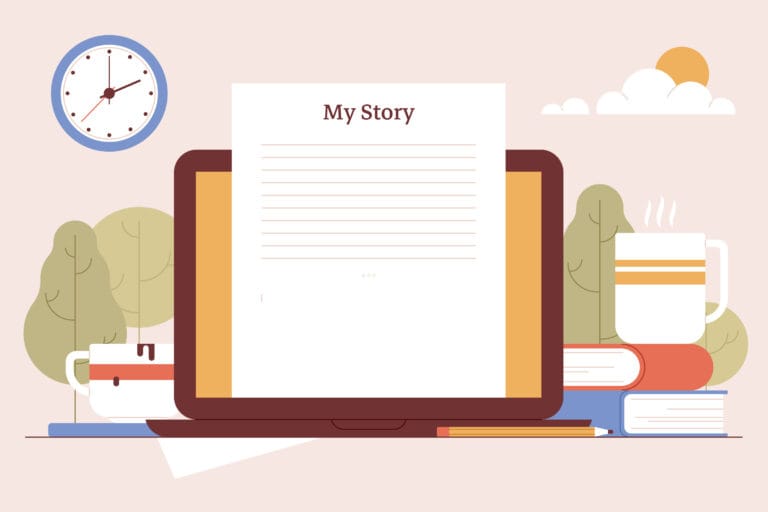Book review writing is a valuable technique that blends literary scrutiny with personal reflection. In fact, it is one of the compositions we teach in compositions course on our website.
Whether you’re a learner required to exhibit your comprehension of a book or a passionate reader who wants to express your views, creating a comprehensive book review enables you to interact profoundly with a piece of literature.
This session will navigate you through the vital ingredients of constructing a book review, helping you scrutinize the author’s notions, evaluate their writing style, and articulate your views in a clear and succinct manner.
By the conclusion of this session, you’ll possess the skills to craft engaging and insightful book reviews that can enlighten and motivate other readers.
Additionally, we added a sample for your review at the end.
Defining Book Review
A book review is a form of literary critique that entails an in-depth examination of a book’s concepts, writing methods, and overall value. It’s a subjective evaluation that mirrors the reviewer’s personal response to the book.
A book review delves into the themes, plot, characters, dialogue, and literary devices employed by the author. It merges the reviewer’s views with insightful commentary, occasionally comparing the book to others by the same author or within a similar genre.
Purpose of Book Reviews
Book reviews fulfill several crucial functions:
- Educational Assignment: Frequently, students are tasked with writing book reviews to show their comprehension of a book and verify they’ve read it.
- Personal Opinion: Book reviews offer a platform for students and readers to voice their personal views regarding the author’s concepts and the book’s subject matter.
- Editorial Practice: Crafting book reviews aids in honing analytical and critical thinking skills, which are integral for budding editors.
Shop laptop and school bags
General Layout of Book Reviews
A book review usually comprises an introduction, main body, and conclusion:
1. Introduction
Reference the book title and author’s name.
Example: “Things Fall Apart by Chinua Achebe.”
Discuss the book cover and any subtitles, if applicable.
Example: “The cover of ‘Things Fall Apart’ features traditional African art, highlighting the cultural setting of the novel.”
Offer a concise summary of the book’s content, introducing the primary points of your review without divulging any opinions at this point.
Example: “Set in pre-colonial Nigeria, ‘Things Fall Apart’ narrates the life of Okonkwo, a respected leader in the Igbo community, and the dramatic changes brought by British colonization and Christian missionaries.”
2. Main Body
Incorporate quotations from the book (minimum of three) to reinforce your analysis.
Example: “Achebe writes, ‘The white man is very clever. He came quietly and peaceably with his religion. We were amused at his foolishness and allowed him to stay. Now he has won our brothers, and our clan can no longer act like one. He has put a knife on the things that held us together and we have fallen apart.'”
Paraphrase these quotations in your own words and interpret them from your viewpoint.
Example: “This quote highlights the subtle and insidious nature of colonization, which gradually disrupts and divides the community.”
Delve into different facets of the book such as themes, plotline, characters, and literary devices, ensuring each point is tackled in a distinct paragraph.
Themes: “One of the central themes in ‘Things Fall Apart’ is the clash between traditional African culture and the impacts of colonialism. Achebe uses the fall of Okonkwo and his community to symbolize the broader disintegration of Igbo society under colonial rule.”
Plotline: “The narrative arc follows Okonkwo’s rise and fall, framed by his strict adherence to traditional values and his inability to adapt to changing times, which ultimately leads to his tragic end.”
Characters: “Okonkwo is portrayed as a complex character, embodying both the strengths and flaws of traditional masculinity. His relationships with other characters, such as his son Nwoye and his friend Obierika, reveal varying responses to cultural change.”
Literary Devices: “Achebe’s use of proverbs and folklore enriches the narrative, grounding it in the oral traditions of the Igbo people. This not only provides authenticity but also serves to contrast the encroaching Western influences.”
3. Conclusion of a Book Review
Render your overall opinion of the book.
Example: “Overall, ‘Things Fall Apart’ is a powerful and poignant exploration of cultural conflict and change.”
Clarify whether you would endorse the book and why.
Example: “I highly recommend this book for its insightful depiction of African culture and the profound impacts of colonization.”
Recap the key points and quotations discussed in the main body.
Example: “Achebe’s masterful storytelling and rich cultural context make ‘Things Fall Apart’ a compelling read, with memorable characters and a thought-provoking narrative.”
Conclude with a sentence that encapsulates your review.
Example: “In essence, ‘Things Fall Apart’ is not just a story about one man’s tragedy but a profound commentary on the upheaval of an entire culture.”
Tips for Writing a Book Review
Shop laptop and school bags
Avoid Repetition
Ensure your book review is fresh and doesn’t merely reiterate the book’s plot. Infuse a new perspective and personal insights.
Be Concise
Keep your analysis on point and avoid superfluous chatter. Readers seek your critical evaluation of the book.
Support Your Claims and Positions
While it’s crucial to express your opinion, always back your viewpoints with evidence from the book, akin to supporting arguments in an academic essay.
Proofread
Prior to submitting your book review, proofread it thoroughly. Look for grammatical or spelling errors and ensure your review is polished and professional.
Conclusion:
Writing a book review extends beyond merely summarizing a story; it’s a chance to engage critically with a text and share your insights with others. Through this session, you’ve learned how to structure a book review, analyze key components of a book, and articulate your personal opinions backed by evidence from the text.
By adhering to the guidelines and tips provided, you can craft reviews that are not only informative but also engaging and reflective of your unique perspective. Whether for academic purposes or personal pleasure, mastering the art of book review writing will amplify your appreciation of literature and enhance your critical thinking and writing skills.







